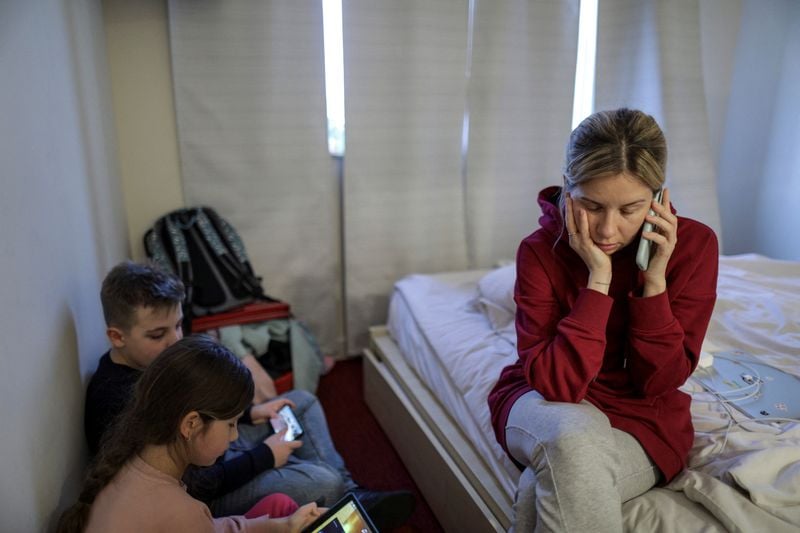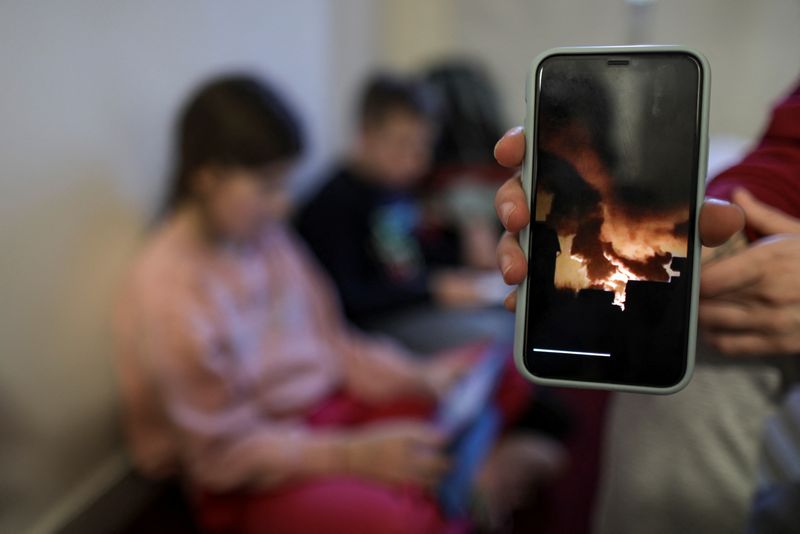By Luiza Ilie
BUCHAREST – The day before Russia invaded Ukraine, Iryna Kyrychenko and her husband went to sleep thinking they would take their two young daughters to visit their grandmother the next day.
Instead, they woke up in their house in Kyiv to sounds of missile explosions, hastily packed some clothes, and fled.
First they went to friends in a village nearby, then to a city in western Ukraine, then across the Romanian border, leaving Kyrychenko’s husband, who at 38 is of conscription age, behind.
Three days later, Iryna Kyrychenko, a 37-year-old operations manager at a tech company, and her two daughters, Xenia, 11 and Alisa, 7, reached the Romanian capital Bucharest, miles removed from a life in Kyiv she describes as “very simple, very nice”.
Nearly 400,000 people had fled into central Europe by Sunday, with queues at border crossings stretching back for kilometres.
“When we were driving, some rockets exploded near us,” she said about their journey in the room she booked at a budget hotel near Bucharest’s main railway station.
“It was really dangerous … the kids right now are scared of airplanes here and if somewhere in the street there is a big noise, they are scared.”
She said the 500-km (300-mile) drive from the village not far from Kyiv to the city of Chernivtsi in western Ukraine near the northern Romanian border crossing of Siret took them 14 hours as not all petrol stations had fuel.
Kyrychenko’s husband drove them as close to the border checkpoint as he could, but the long line of vehicles meant she and her daughters went the last 6 km (4 miles) on foot.
After a two-hour wait, they crossed into Romania on Friday morning, where they were met by volunteers carrying food, hot drinks and offers of transport and lodging.
“The kids were full of food, snacks, some fruit, water, toys also,” she said as Xenia played on a tablet near her. The teddy bears volunteers had given them were resting on the windowsill next to the school supplies they brought with them from Kyiv.
Her voice crumbled as she recalled how “the children were crying because they left their father”.
After resting for a few hours at a volunteer’s house, Kyrychenko, who is Russian Ukrainian, pressed on to Bucharest, where she now spends frantic hours on Telegram channels looking at pictures of her devastated home town and news of civilian buildings being hit, including a children’s hospital.
She is also helping her company colleagues as they too cross borders and make their way to Bucharest and Warsaw.
“It’s very hard to cross the border now, when we were crossing there were maybe 100-200 people, but right now it’s maybe 3,000. It’s a crowd, everybody is nervous, no water, they stay all night on the street with the kids, it’s cold weather.”
Kyrychenko’s mother, brother, elderly grandparents and mother-in-law are still in Kyiv and unable to leave. She said she will stay in Bucharest for now but could later move to Lisbon where her employer has an office.
“We’re scared about our husbands, our brothers and other men who stay here,” she said. “Life in Kyiv before was very simple, very nice, we can say anything we want, we can do everything we want. Kyiv is very beautiful, very ancient city, I’m scared that they destroy it. We don’t know how to go back.”
(Reporting by Luiza Ilie; Additional reporting by Octav Ganea; Editing by Philippa Fletcher)


